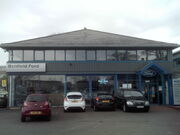| http://upload.wikimedia.org/wikipedia/commons/thumb/a/a0/Ford_Motor_Company_Logo.svg/250px-Ford_Motor_Company_Logo.svg.png | |
| Type | Public company |
|---|---|
| Industry | Automotive |
| Founded | June 16, 1903 |
| Founder(s) | Henry Ford |
| Headquarters | Dearborn, Michigan, U.S. |
| Area served | Worldwide |
| Key people | William C. Ford, Jr.
(Executive Chairman) Alan R. Mulally (President & CEO) |
| Products | Automobiles
Automotive parts |
| Services | Automotive finance
Vehicle leasing Vehicle service |
Ford Motor Company is an American multinational based in Dearborn, Michigan, a suburb of Detroit. The automaker was founded by Henry Ford and incorporated on June 16, 1903. In addition to the Ford and Lincoln brands, Ford also owns the brands of Mazda, Jaguar, Land Rover, Volvo, and Aston Martin. In 2010, Ford brough the Chevrolet brand from General Motors , which bankrupt in mid-2011. Ford discontinued the Mercury brand after the 2011 model was released that year. Ford introduced methods for large-scale manufacturing of cars and large-scale management of an industrial workforce using elaborately engineered manufacturing sequences typified by moving assembly lines. Henry Ford's methods came to be known around the world as Fordism by 1914. Ford is the largest automaker in the U.S, and the second-largest in the world, beaten only by Toyota . In 2008, Ford produced 6.532 million automobiles and employed about 314,000 employees at around 95 plants and facilities worldwide. Starting in 2007, Ford received more initial quality survey awards from J. D. Power and Associates than any other automaker. Five of Ford's vehicles ranked at the top of their categories and fourteen vehicles ranked in the top three.
Global markets[]
Initially, Ford Motor Company models sold outside the U.S. were essentially versions of those sold on the home market, but later on, models specific to Europe were developed and sold. Attempts to globalize the model line have often failed, with Europe's Ford Mondeo selling poorly in the United States as the Ford Contour
, while U.S. models
Ford Dealership in Britain
Ford Taurushave fared poorly in Japan and Australia, even when produced in right hand drive. The small European model Ka, a hit in its home market, did not catch on in Japan, as it was not available as an automatic. The Mondeo was dropped by Ford Australia, because the segment of the market in which it competes had been in steady decline, with buyers preferring the larger local model, the Falcon. One recent exception is the European model of the Focus, which has sold strongly on both sides of the Atlantic.
Enviormental Intiatives[]
Ford Motor Co. expects electric vehicles will represent a "major portion" of its lineup a decade from now as the automaker breaks away from a recent reliance on pickup trucks and SUVs. The stakes are high because Ford's stepped-up investment is coming at a time when the U.S. government is demanding steep increases in fuel economy and has put money forward to help automakers adopt new fuel-saving technologies. In 2005 Ford announced its goal to make 250,000 hybrids a year by 2010, but by mid-2006 announced that it would not meet that goal, due to excessively high costs and the lack of sufficient supplies of the hybrid-electric batteries and drivetrain system components. Ford also continues to study Fuel Cell-powered electric powertrains, and has demonstrated hydrogen-fueled internal combustion engine technologies, as well as developing the next-generation hybrid-electric systems. Compared with conventional vehicles, hybrid vehicles and/or fuel cell vehicles decrease air pollution emissions as well as sound levels, with favorable impacts upon respiratory health and decrease of noise health effects.
